Antonio Ferrara
Size-adaptive Hypothesis Testing for Fairness
Jun 12, 2025Abstract:Determining whether an algorithmic decision-making system discriminates against a specific demographic typically involves comparing a single point estimate of a fairness metric against a predefined threshold. This practice is statistically brittle: it ignores sampling error and treats small demographic subgroups the same as large ones. The problem intensifies in intersectional analyses, where multiple sensitive attributes are considered jointly, giving rise to a larger number of smaller groups. As these groups become more granular, the data representing them becomes too sparse for reliable estimation, and fairness metrics yield excessively wide confidence intervals, precluding meaningful conclusions about potential unfair treatments. In this paper, we introduce a unified, size-adaptive, hypothesis-testing framework that turns fairness assessment into an evidence-based statistical decision. Our contribution is twofold. (i) For sufficiently large subgroups, we prove a Central-Limit result for the statistical parity difference, leading to analytic confidence intervals and a Wald test whose type-I (false positive) error is guaranteed at level $\alpha$. (ii) For the long tail of small intersectional groups, we derive a fully Bayesian Dirichlet-multinomial estimator; Monte-Carlo credible intervals are calibrated for any sample size and naturally converge to Wald intervals as more data becomes available. We validate our approach empirically on benchmark datasets, demonstrating how our tests provide interpretable, statistically rigorous decisions under varying degrees of data availability and intersectionality.
Bounded-Abstention Pairwise Learning to Rank
May 29, 2025Abstract:Ranking systems influence decision-making in high-stakes domains like health, education, and employment, where they can have substantial economic and social impacts. This makes the integration of safety mechanisms essential. One such mechanism is $\textit{abstention}$, which enables algorithmic decision-making system to defer uncertain or low-confidence decisions to human experts. While abstention have been predominantly explored in the context of classification tasks, its application to other machine learning paradigms remains underexplored. In this paper, we introduce a novel method for abstention in pairwise learning-to-rank tasks. Our approach is based on thresholding the ranker's conditional risk: the system abstains from making a decision when the estimated risk exceeds a predefined threshold. Our contributions are threefold: a theoretical characterization of the optimal abstention strategy, a model-agnostic, plug-in algorithm for constructing abstaining ranking models, and a comprehensive empirical evaluations across multiple datasets, demonstrating the effectiveness of our approach.
DataRec: A Framework for Standardizing Recommendation Data Processing and Analysis
Oct 30, 2024



Abstract:Thanks to the great interest posed by researchers and companies, recommendation systems became a cornerstone of machine learning applications. However, concerns have arisen recently about the need for reproducibility, making it challenging to identify suitable pipelines. Several frameworks have been proposed to improve reproducibility, covering the entire process from data reading to performance evaluation. Despite this effort, these solutions often overlook the role of data management, do not promote interoperability, and neglect data analysis despite its well-known impact on recommender performance. To address these gaps, we propose DataRec, which facilitates using and manipulating recommendation datasets. DataRec supports reading and writing in various formats, offers filtering and splitting techniques, and enables data distribution analysis using well-known metrics. It encourages a unified approach to data manipulation by allowing data export in formats compatible with several recommendation frameworks.
KGUF: Simple Knowledge-aware Graph-based Recommender with User-based Semantic Features Filtering
Mar 29, 2024



Abstract:The recent integration of Graph Neural Networks (GNNs) into recommendation has led to a novel family of Collaborative Filtering (CF) approaches, namely Graph Collaborative Filtering (GCF). Following the same GNNs wave, recommender systems exploiting Knowledge Graphs (KGs) have also been successfully empowered by the GCF rationale to combine the representational power of GNNs with the semantics conveyed by KGs, giving rise to Knowledge-aware Graph Collaborative Filtering (KGCF), which use KGs to mine hidden user intent. Nevertheless, empirical evidence suggests that computing and combining user-level intent might not always be necessary, as simpler approaches can yield comparable or superior results while keeping explicit semantic features. Under this perspective, user historical preferences become essential to refine the KG and retain the most discriminating features, thus leading to concise item representation. Driven by the assumptions above, we propose KGUF, a KGCF model that learns latent representations of semantic features in the KG to better define the item profile. By leveraging user profiles through decision trees, KGUF effectively retains only those features relevant to users. Results on three datasets justify KGUF's rationale, as our approach is able to reach performance comparable or superior to SOTA methods while maintaining a simpler formalization. Link to the repository: https://github.com/sisinflab/KGUF.
Demographic Parity Inspector: Fairness Audits via the Explanation Space
Mar 14, 2023

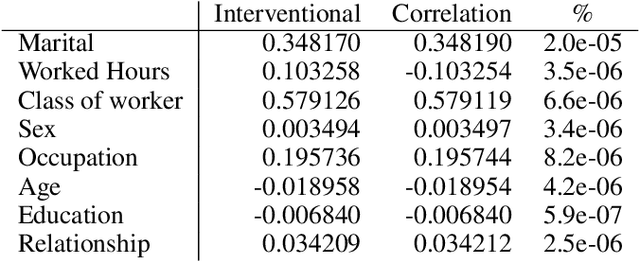

Abstract:Even if deployed with the best intentions, machine learning methods can perpetuate, amplify or even create social biases. Measures of (un-)fairness have been proposed as a way to gauge the (non-)discriminatory nature of machine learning models. However, proxies of protected attributes causing discriminatory effects remain challenging to address. In this work, we propose a new algorithmic approach that measures group-wise demographic parity violations and allows us to inspect the causes of inter-group discrimination. Our method relies on the novel idea of measuring the dependence of a model on the protected attribute based on the explanation space, an informative space that allows for more sensitive audits than the primary space of input data or prediction distributions, and allowing for the assertion of theoretical demographic parity auditing guarantees. We provide a mathematical analysis, synthetic examples, and experimental evaluation of real-world data. We release an open-source Python package with methods, routines, and tutorials.
Sparse Feature Factorization for Recommender Systems with Knowledge Graphs
Jul 29, 2021



Abstract:Deep Learning and factorization-based collaborative filtering recommendation models have undoubtedly dominated the scene of recommender systems in recent years. However, despite their outstanding performance, these methods require a training time proportional to the size of the embeddings and it further increases when also side information is considered for the computation of the recommendation list. In fact, in these cases we have that with a large number of high-quality features, the resulting models are more complex and difficult to train. This paper addresses this problem by presenting KGFlex: a sparse factorization approach that grants an even greater degree of expressiveness. To achieve this result, KGFlex analyzes the historical data to understand the dimensions the user decisions depend on (e.g., movie direction, musical genre, nationality of book writer). KGFlex represents each item feature as an embedding and it models user-item interactions as a factorized entropy-driven combination of the item attributes relevant to the user. KGFlex facilitates the training process by letting users update only those relevant features on which they base their decisions. In other words, the user-item prediction is mediated by the user's personal view that considers only relevant features. An extensive experimental evaluation shows the approach's effectiveness, considering the recommendation results' accuracy, diversity, and induced bias. The public implementation of KGFlex is available at https://split.to/kgflex.
Elliot: a Comprehensive and Rigorous Framework for Reproducible Recommender Systems Evaluation
Mar 03, 2021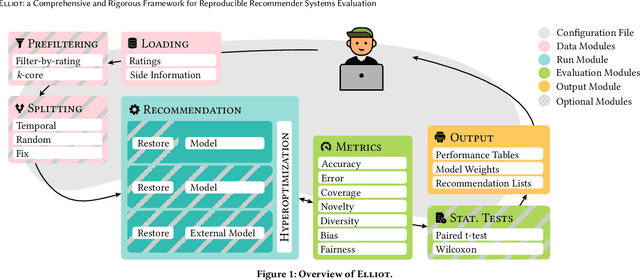
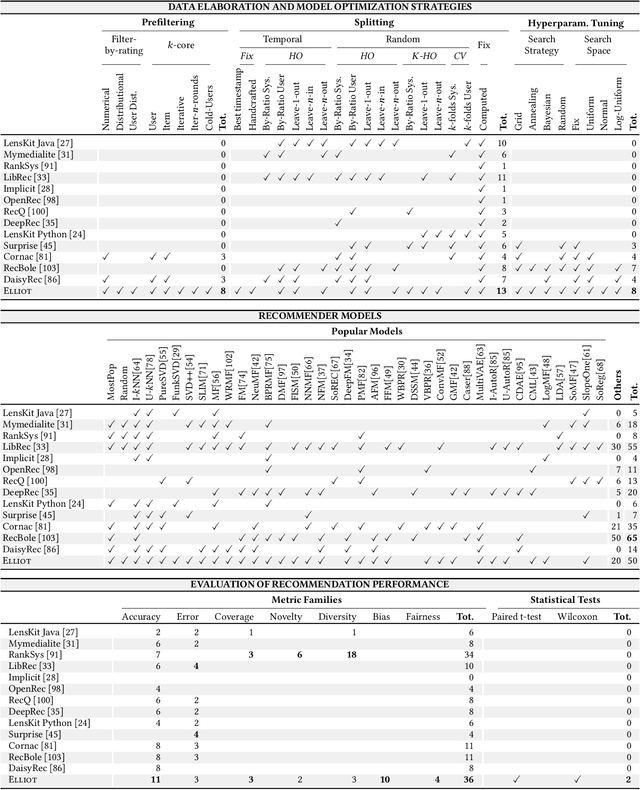
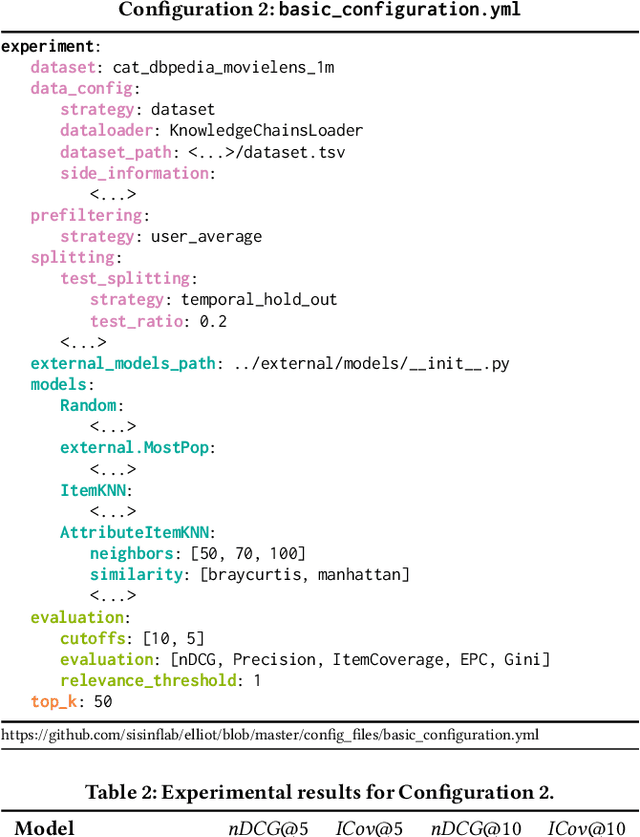
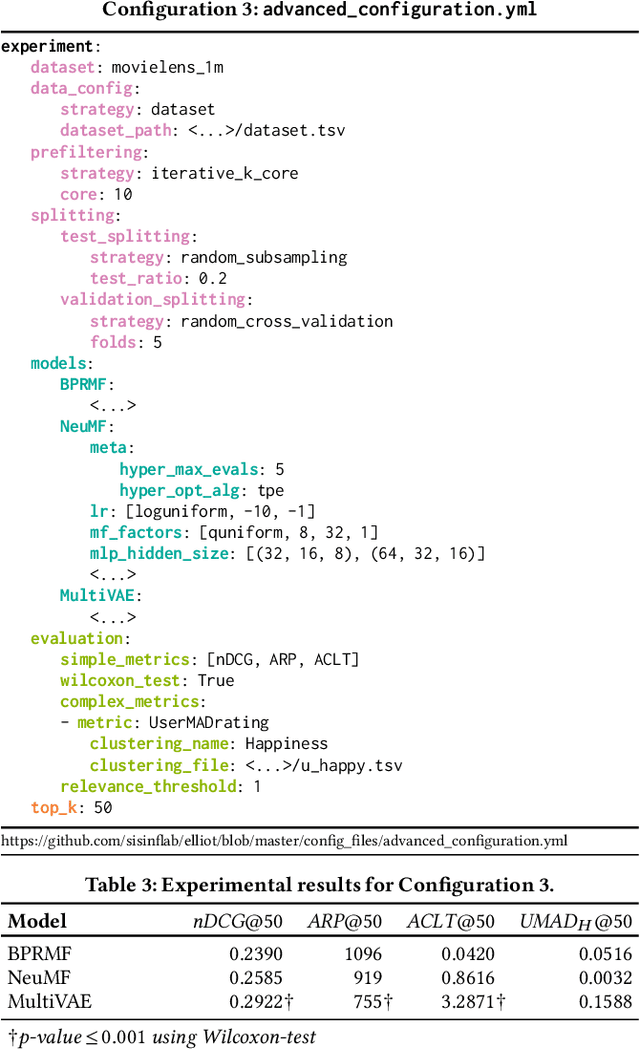
Abstract:Recommender Systems have shown to be an effective way to alleviate the over-choice problem and provide accurate and tailored recommendations. However, the impressive number of proposed recommendation algorithms, splitting strategies, evaluation protocols, metrics, and tasks, has made rigorous experimental evaluation particularly challenging. Puzzled and frustrated by the continuous recreation of appropriate evaluation benchmarks, experimental pipelines, hyperparameter optimization, and evaluation procedures, we have developed an exhaustive framework to address such needs. Elliot is a comprehensive recommendation framework that aims to run and reproduce an entire experimental pipeline by processing a simple configuration file. The framework loads, filters, and splits the data considering a vast set of strategies (13 splitting methods and 8 filtering approaches, from temporal training-test splitting to nested K-folds Cross-Validation). Elliot optimizes hyperparameters (51 strategies) for several recommendation algorithms (50), selects the best models, compares them with the baselines providing intra-model statistics, computes metrics (36) spanning from accuracy to beyond-accuracy, bias, and fairness, and conducts statistical analysis (Wilcoxon and Paired t-test). The aim is to provide the researchers with a tool to ease (and make them reproducible) all the experimental evaluation phases, from data reading to results collection. Elliot is available on GitHub (https://github.com/sisinflab/elliot).
FedeRank: User Controlled Feedback with Federated Recommender Systems
Jan 20, 2021


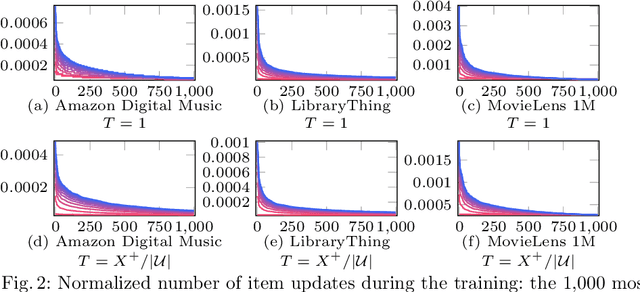
Abstract:Recommender systems have shown to be a successful representative of how data availability can ease our everyday digital life. However, data privacy is one of the most prominent concerns in the digital era. After several data breaches and privacy scandals, the users are now worried about sharing their data. In the last decade, Federated Learning has emerged as a new privacy-preserving distributed machine learning paradigm. It works by processing data on the user device without collecting data in a central repository. We present FedeRank (https://split.to/federank), a federated recommendation algorithm. The system learns a personal factorization model onto every device. The training of the model is a synchronous process between the central server and the federated clients. FedeRank takes care of computing recommendations in a distributed fashion and allows users to control the portion of data they want to share. By comparing with state-of-the-art algorithms, extensive experiments show the effectiveness of FedeRank in terms of recommendation accuracy, even with a small portion of shared user data. Further analysis of the recommendation lists' diversity and novelty guarantees the suitability of the algorithm in real production environments.
How to Put Users in Control of their Data via Federated Pair-Wise Recommendation
Aug 17, 2020



Abstract:Recommendation services are extensively adopted in several user-centered applications as a tool to alleviate the information overload problem and help users in orienteering in a vast space of possible choices. In such scenarios, privacy is a crucial concern since users may not be willing to share their sensitive preferences (e.g., visited locations, read books, bought items) with a central server. Unfortunately, data harvesting and collection is at the basis of modern, state-of-the-art approaches to recommendation. Decreased users' willingness to share personal information along with data minimization/protection policies (such as the European GDPR), can result in the "data scarcity" dilemma affecting data-intensive applications such as recommender systems (RS). We argue that scarcity of adequate data due to privacy concerns can severely impair the quality of learned models and, in the long term, result in a turnover and disloyal customers with direct consequences for lives, society, and businesses. To address these issues, we present FPL, an architecture in which users collaborate in training a central factorization model while controlling the amount of sensitive data leaving their devices. The proposed approach implements pair-wise learning to rank optimization by following the Federated Learning principles conceived originally to mitigate the privacy risks of traditional machine learning. We have conducted an extensive experimental evaluation on three Foursquare datasets and have verified the effectiveness of the proposed architecture concerning accuracy and beyond-accuracy objectives. We have analyzed the impact of communication cost with the central server on the system's performance, by varying the amount of local computation and training parallelism. Finally, we have carefully examined the impact of disclosed users' information on the quality of the final model and ...
Prioritized Multi-Criteria Federated Learning
Jul 17, 2020



Abstract:In Machine Learning scenarios, privacy is a crucial concern when models have to be trained with private data coming from users of a service, such as a recommender system, a location-based mobile service, a mobile phone text messaging service providing next word prediction, or a face image classification system. The main issue is that, often, data are collected, transferred, and processed by third parties. These transactions violate new regulations, such as GDPR. Furthermore, users usually are not willing to share private data such as their visited locations, the text messages they wrote, or the photo they took with a third party. On the other hand, users appreciate services that work based on their behaviors and preferences. In order to address these issues, Federated Learning (FL) has been recently proposed as a means to build ML models based on private datasets distributed over a large number of clients, while preventing data leakage. A federation of users is asked to train a same global model on their private data, while a central coordinating server receives locally computed updates by clients and aggregate them to obtain a better global model, without the need to use clients' actual data. In this work, we extend the FL approach by pushing forward the state-of-the-art approaches in the aggregation step of FL, which we deem crucial for building a high-quality global model. Specifically, we propose an approach that takes into account a suite of client-specific criteria that constitute the basis for assigning a score to each client based on a priority of criteria defined by the service provider. Extensive experiments on two publicly available datasets indicate the merits of the proposed approach compared to standard FL baseline.
 Add to Chrome
Add to Chrome Add to Firefox
Add to Firefox Add to Edge
Add to Edge